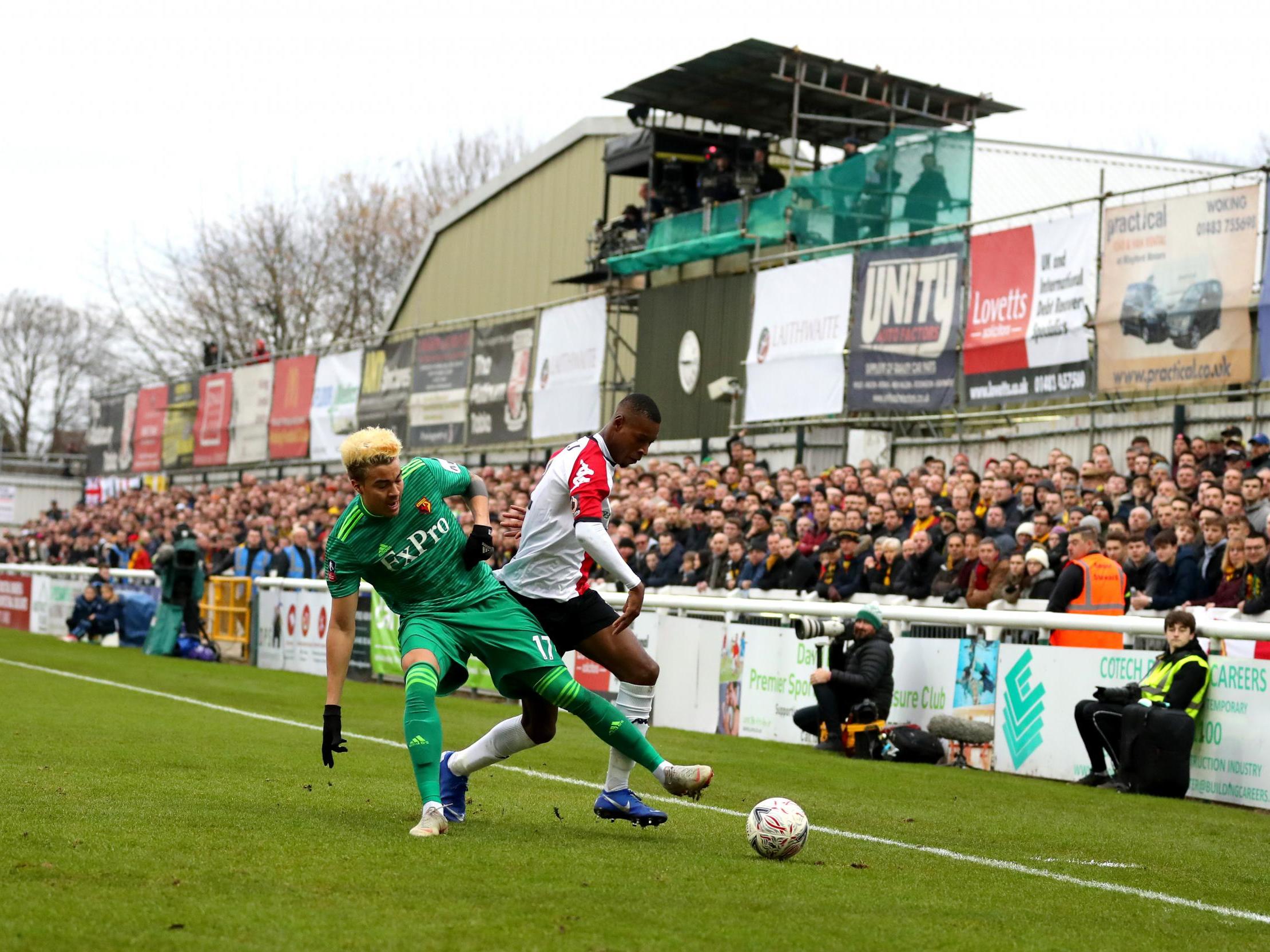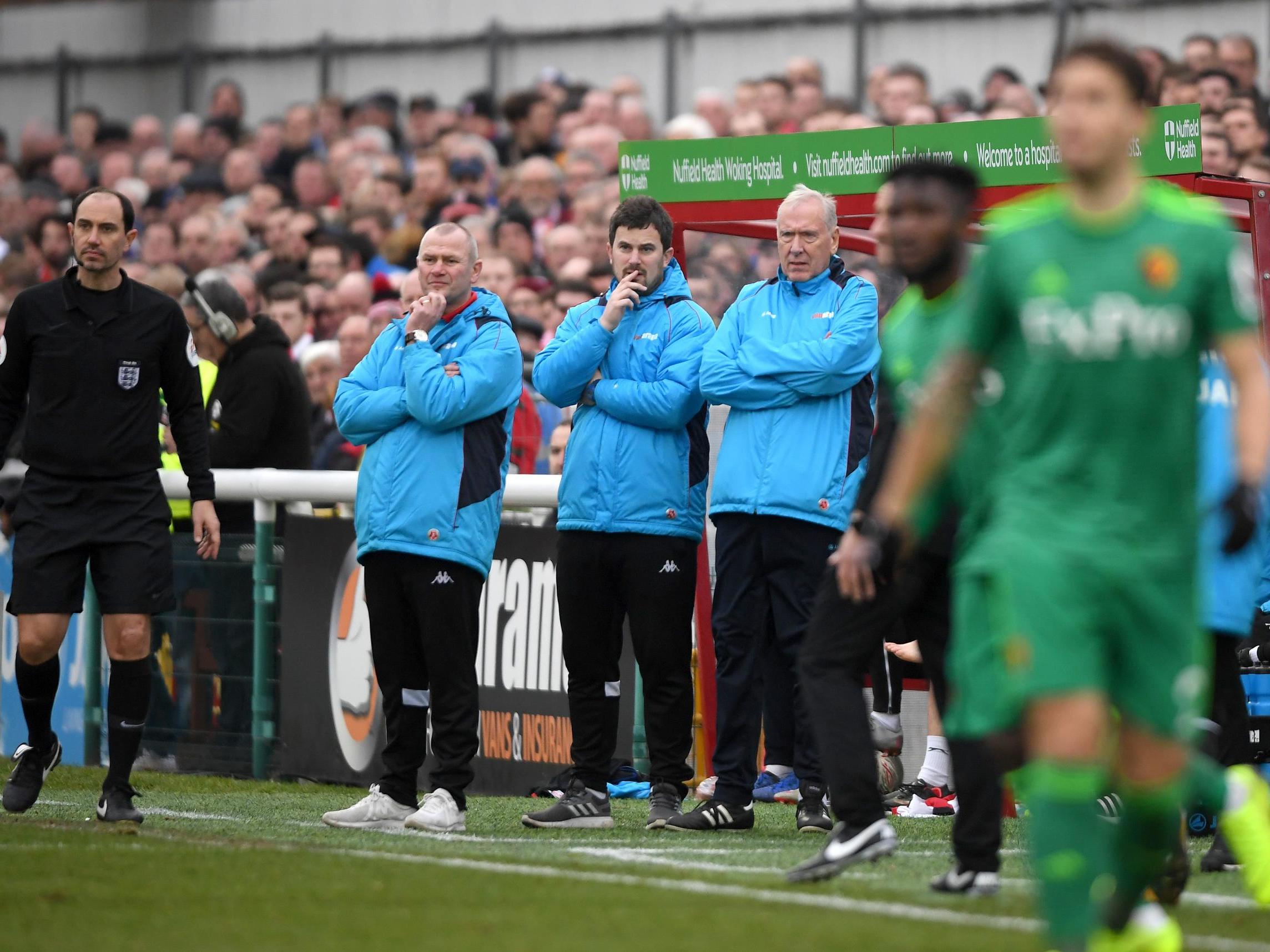To judge the FA Cup on its results misses the point entirely
Ahead of Woking's FA Cup clash with Watford, The Independent's Chief Sports Writer Jonathan Liew went behind the scenes at Kingfield Stadium. Here's what he found


Your support helps us to tell the story
From reproductive rights to climate change to Big Tech, The Independent is on the ground when the story is developing. Whether it's investigating the financials of Elon Musk's pro-Trump PAC or producing our latest documentary, 'The A Word', which shines a light on the American women fighting for reproductive rights, we know how important it is to parse out the facts from the messaging.
At such a critical moment in US history, we need reporters on the ground. Your donation allows us to keep sending journalists to speak to both sides of the story.
The Independent is trusted by Americans across the entire political spectrum. And unlike many other quality news outlets, we choose not to lock Americans out of our reporting and analysis with paywalls. We believe quality journalism should be available to everyone, paid for by those who can afford it.
Your support makes all the difference.Alan Dowson’s office at Kingfield Stadium is not a large place. Strictly speaking, it’s not really an office at all, just a temporary Portakabin around the back of the main stand, opposite the bar, around the corner from the toilets.
And yet, two hours before kick-off, there are exactly sixteen people in it. Various coaches in club tracksuits buzzing around consulting clipboards. A few club grandees perched on a sofa, chatting eagerly. Martin Tyler, the Sky commentator and part-time coach, deep in conversation with a couple of unidentified local VIPs. An intrepid journalist from The Independent standing in the corner, wondering if anyone will notice if he grabs that spare pain au chocolat off the table. And at the centre of it all Dowson himself, a man who, as he makes his final preparations ahead of the biggest Cup game in Woking’s recent history, you suspect would probably appreciate a little peace and quiet.
As it happens, Dowson is a natural raconteur, and the 55-year-old Geordie (albeit a Sunderland fan) is more than happy to chat to anyone and everyone. He points out the bottle of Newcastle Brown Ale chilling in his mini-fridge, a gift for the Watford manager, who will be paying him a visit after the game. “I only learned his name yesterday morning,” he quips. “Havi Gracia? Chavi Gracia? I’ve heard he’s got a bottle of something for me, as well.”
Midfielder Max Kretzschmar bursts in, clutching a newspaper under his arm. He’s injured for this game, but he beams with pride as he shows us the preview article he’s written for that weekend’s edition of The Sunday Times. I joke that this means we’re now technically in the same profession. “F---ing hell, I hope you can write better than he can,” Dowson says.
Multiply this scene by a dozen, by several dozen, perhaps even by hundreds, and you have the FA Cup. It’s around this time of year that you get the usual moaning and groaning about a competition that depending on who you consult, either needs to change or has changed too much, or possibly even both. The people who complain about the hegemony of the big Premier League clubs are often the same people who cock a snook at Newport v Leicester. The people who complain about the lack of grassroots funding are often the same people who complain about ties being moved in the service of a £780 million TV deal that will be overwhelmingly diverted towards grassroots funding. Some people, you suspect, just like complaining.
As it turned out, it was a fairly shock-laden third round, with Barnet turning over Sheffield United, Newport beating Leicester, Gillingham knocking out Cardiff and Fulham taking the lead at home to Oldham, before normal service was resumed with a 2-1 defeat. But here’s the thing. It didn’t have to be. The glory of the FA Cup is also to be found in its occasional drudgery, the grace of the pure upset measured in its inestimable, interminable wasted hours watching two Championship reserve sides battling out an unloved 1-1 draw in front of tens of thousands of empty seats.
People scoff at the prize money, which at £7 million for the winners is roughly equivalent to an extra couple of places in the Premier League. But to clubs lower down the pyramid, the money from a Cup run can be genuinely transformative. Most people will remember Lincoln’s stunning run to the quarter-finals two seasons ago, but considerably fewer will have been at Scampton in November, when the club unveiled the new £1.3m training ground that has been built with its proceeds. Boasting three elite-standard pitches, a gym, new offices and two TV towers allowing the club’s analysts to film training sessions, it’s a testament to the power of the FA Cup to turn around the fortunes of smaller clubs in a sport where they are so easily forgotten.
You don’t even have to go on a giant-killing spree to benefit. The $1 billion global television deal the FA signed over a six-year period – considerably more than it would have pocketed for selling Wembley Stadium to Shahid Khan – will go not into the pockets of Premier League clubs, but into community projects and grassroots facilities the length of the country. And so to judge the FA Cup on its results is, in a way, to miss the point entirely. Perhaps it’s better to think of it as perhaps English football’s most powerful redistributive force in a game becoming ever more efficient at funnelling money ruthlessly towards the top.

For Dowson and for Woking, there will be no giantkilling. Watford run out comfortable 2-0 winners, and yet in many ways it’s Woking who have enjoyed the greater triumph. “It’s money we can’t dream of,” he says. “We’ll build a club. I’ll be able to get a new kettle for my office, because at the moment I have to walk about 20 miles for a cup of tea. It took three months to get a heater.”
Gracia steps into the office for a chat. He accepts his bottle of “broon” and bears a bottle of Spanish sangria in return. They chat genially for a while, and then Watford have to go, get back on the coach, step back inside their gilded millionaires’ cage. They probably won’t be back for a while. But Dowson will, on Monday morning. “I’ll get lashed tonight and then be back,” he says. “A working men’s club with darts and pool. I’m not into wine bars and that rubbish. Proper people, that’s what you want. The money is great, but it’s about the people. I hope they come back.”
It’ll be a while before Dowson’s office is this busy again. Welling United await on Wednesday night, and then a tense promotion campaign. But they’ll remember these few days at Woking for a long while yet: a week when Kingfield heaved with people and song and anticipation and yes, why, not, magic. A week when the world descended on Woking and yet left it quietly improved. “Don’t let anyone,” Dowson warns us before we all go our separate ways, “tell you the FA Cup is dead.”
Join our commenting forum
Join thought-provoking conversations, follow other Independent readers and see their replies
Comments